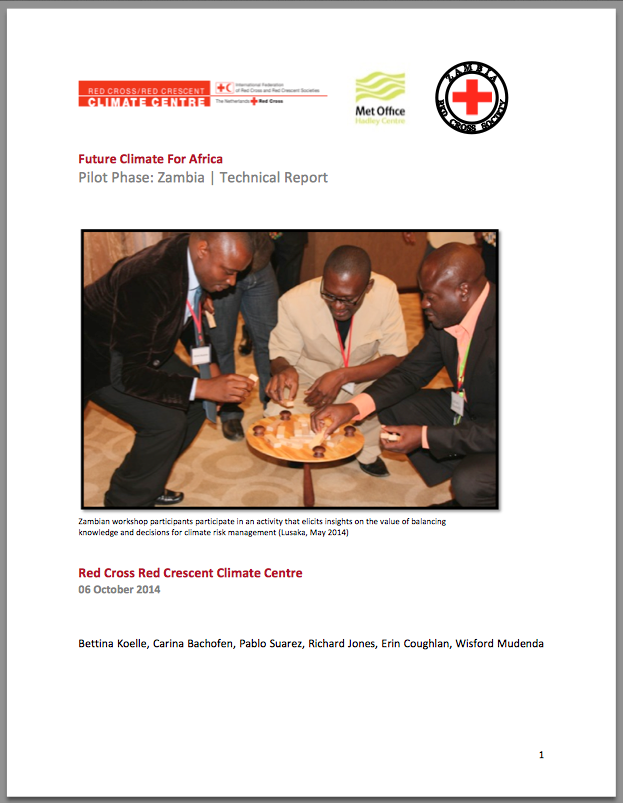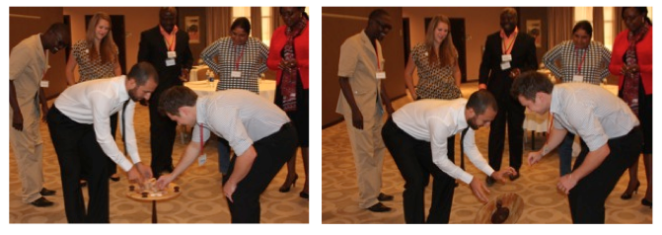FCFA Pilot: Future Climate For Africa Pilot Phase: Zambia Technical Report

Summary
Future Climate for Africa (FCFA) is a new five-year international research programme jointly funded by the UK’s Department for International Development (DFID) and the Natural Environment Research Council (NERC). The aim of the FCFA programme is to support research to better understand and improve confidence in predictions of climate variability and change across sub-Saharan Africa on timescales to inform adaptation. The programme will have a major focus on climate science and modelling, underpinned by the principles of informing real decisions, with emphasis on enhancing the usefulness of climate science and projections, and on adoption of a multidisciplinary approach.
Zambia case study
The Red Cross Red Crescent Climate Centre (RCCC), in collaboration with the Met Office Hadley Centre (MOHC) and the Zambia Red Cross Society (ZRCS) led the Future Climate for Africa pilot study in Zambia, which sought to examine how to make climate science actionable, so decision-makers could make informed adaptation and development investments robust to a range of possible outcomes in the near- to medium-term future.

Recommendations
The FCFA Zambia pilot study comprised multi-sector, multi-stakeholder workshops, as well as primary and secondary research of climate science and its applications. This endeavor, led by the Red Cross Red Crescent Climate Centre in collaboration with the Met Office Hadley Centre (MOHC) and the Zambia Red Cross Society (ZRCS), yielded the following recommendations for the consideration of policymakers and for DFID in particular:
-
Invest in climate science that directly enables decisions that are robust to a changing climate. Recognizing the inherent uncertainty that shapes our understanding of future conditions, determine what climate information will allow decision-makers to choose between investment options, and invest in climate research to deliver such information.
-
Integrate climate information into incentives for long-term engagement. Historical data, forecasts, projections and other climate information should be considered within a full range of system complexities such as delays, feedbacks, trade offs and thresholds, in order to help climate service providers support stakeholders to find solutions over the long term.
-
Promote interactive approaches to learning and dialogue for climate-smart decisions. Design and deploy creative, intensely interactive processes that can break down communication barriers and build trust between producers and users of science, enabling more productive dialogue and decision-making. Complex decision-making requires serious exploration and collaboration across disciplines and with international partners.
-
Link climate information thresholds to decisions for climate-smart resource allocation. Develop forecast-based mechanisms, including financial instruments, to support climate-smart, timely and reliable risk management informed by science at various timescales.
-
Foster open data and hybrid systems to accelerate adaptation under uncertainty. Unlock existing data making it legally and technically accessible, while nurturing involvement of weather and climate service expertise in order to help align information to action. Hybrid human and computer systems can speed up adaptation by enabling improved collation, analysis and dissemination of climate-related data; and thus how knowledge informs action about opportunities and risks.
-
Create information pathways between vulnerable communities, decision-makers and researchers. Engage local, traditional knowledge along with climate science to facilitate interaction among those groups, building trust and increasing engagement of local experts.
Authors
Bettina Koelle, Carina Bachofen, Pablo Suarez, Richard Jones, Erin Coughlan, Wisford Mudenda
(0) Comments
There is no content